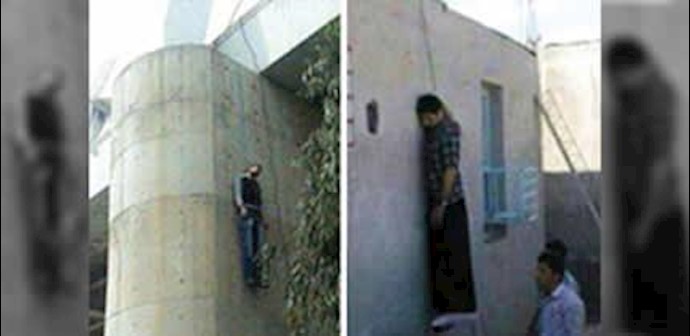On Monday, February 17, as Rouhani entered the Oil Ministry building in Tehran, a retired oil industry employee set himself ablaze in protest at the appalling living conditions of retired people, including their removal from their company houses and the ignoring of their requests by regime officials.
The barbaric oppression and the anti-Iranian and inhumane policies of the clerical regime that have let unemployment, poverty and corruption spread at an unprecedented rate have resulted in a sharp increase in suicides. Some examples of this phenomenon in recent weeks are as follows:
On January 21, a middle-aged woman set herself ablaze in front of a security forces station in the city of Mobarakeh, in Isfahan. This long-suffering mother, whose efforts to free her innocent son had got nowhere, poured gasoline on herself and ignited it in protest at the arrest and torture of her son.
On January 21, a young street vendor committed suicide by throwing himself under a train in protest at the confiscation of his petty merchandise by Tehran’s municipal agents. His body was gruesomely cut in half under the wheels of a train. This shocking incident happened in the Golbarg Station of Tehran’s underground metro after the regime’s agents, who are accustomed to extorting and plundering the property of the toilers, confiscated this deprived young man’s good which were worth less than three dollars and were his only means of supporting his family. He had told the agents that if they did not return his merchandise, he would throw himself under the train, but they paid no heed to his request.
On January 26, Khossrow Haidarian, from Najafabad, in Isfahan who had been fired from working in Fouland Mobarakeh factory, jumped from the fifth floor of an unfinished apartment building in protest at unemployment and poverty and lost his life. Before he committed suicide, he threw one hundred copies of a letter he had written from the top of the building where he had written: “Everyone should know that the great ruler of this country is responsible for my death. Despite working 14 hours a day, I cannot pay my debts.”
On February 1, a 29-year-old woman from city of Andimeshk, in Khuzestan Province, one of the principle oil-rich provinces in the country, set herself ablaze and died after her husband was fired from the factory. She was the mother of a seven-year-old girl.
On February 2, a 35-year-old man from the town of Kangan, in Bushehr Province, hanged himself in his home, sparking anger among local people.
On February 3, a man named Hossein from the city of Ilam set himself ablaze due to the pressure of poverty. He was married and had three children.
On February 5, the shocking picture of the suicide of a deprived young man in Ahvaz was widely published.
Also, on February 6, a 27-year-old man by the name of Arash Pashaei, who was in Unit 4 of the Ghezel Hessar Prison, hanged himself after nine years of suffering behind bars.
The Iranian people are fighting massive hardship while hundreds of billions of dollars of their wealth is being wasted by the mullahs’ regime on their ominous nuclear project, export of terrorism and warmongering in the countries of the region such as Syria, Iraq, Yemen and Bahrain.
Vast sums are also usurped in astronomical embezzlements and sent to the bank accounts of the mullahs and their cronies.
This is the catastrophic situation that supporters of the appeasement-policy knowingly close their eyes to in order to advocate the illusion of “moderation” regarding Hassan Rouhani, and thereby participate in prolonging oppression in Iran.
Iran: Tragic poverty and suppression motivated suicides
RELATED ARTICLES








